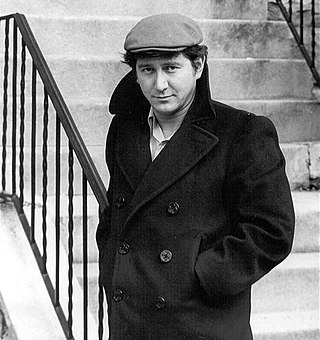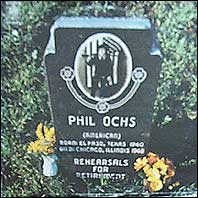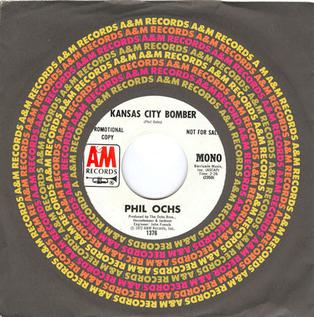Related Research Articles

Philip David Ochs was an American songwriter and protest singer. Ochs was known for his sharp wit, sardonic humor, political activism, often alliterative lyrics, and distinctive voice. He wrote hundreds of songs from the 1960s to early 1970s and released eight albums.

Rehearsals for Retirement is Phil Ochs's sixth album, released in 1969 on A&M Records.
"Power and the Glory" is an American patriotic song by Phil Ochs, a U.S. protest singer from the 1960s known for being a harsh critic of the American military and industrial establishment. Originally released on his 1964 debut album, All the News That's Fit to Sing, "Power and the Glory" is said to have contributed to Ochs' profound impact.
Jim and Jean, composed of Jim Glover and Jean Ray (1941–2007) were an American folk music duo, who performed and recorded music from the early to the late 1960s.
Jim R. Glover is an American peace activist and folk singer. He is from Cleveland, Ohio and lives in Brandon, Florida.
What's That I Hear?: The Songs of Phil Ochs is a 1998 tribute compilation to the music of the late Phil Ochs. The various performers cover several generations of Ochs' admirers. All profits from the album's sales were divided equally between the non-profits, the ACLU Foundation of Southern California and Sing Out! Magazine.

"I Ain't Marching Any More" is an anti-war song by Phil Ochs, a U.S. protest singer from the 1960s known for being a passionate critic of the American military industrial complex. Originally released on his 1965 album of the same name, "I Ain't Marching Any More" is one of Ochs's best-known songs.

"Bwatue" is a song by Phil Ochs, a US singer-songwriter best known for the protest songs he wrote in the 1960s. He co-wrote the song with two African musicians named Dijiba and Bukasa. "Bwatue" was written and recorded in 1973.
"The War Is Over" is an anti-war song by Phil Ochs, an American protest singer in the 1960s and early 1970s. Ochs was famous for harshly criticizing the Vietnam War and the American military-industrial establishment. The song, which was originally released on Tape from California (1968), has been described as "one of the most potent antiwar songs of the 1960s".
"There but for Fortune" is a song by American folk musician Phil Ochs. Ochs wrote the song in 1963 and recorded it twice, for New Folks Volume 2 and Phil Ochs in Concert. Joan Baez also recorded "There but for Fortune" in 1964, and her version of the song became a chart hit.

The discography of Phil Ochs, a U.S. protest singer and songwriter, consists of seven studio albums, six live albums, six compilation albums, one box set, six other albums, and nine singles.
"Crucifixion" is a 1966 song by Phil Ochs, a US singer-songwriter. Ochs described the song as "the greatest song I've ever written".

"Kansas City Bomber" is a song by Phil Ochs, a US singer-songwriter best known for the protest songs he wrote in the 1960s.
"Cross My Heart" is a 1966 song by Phil Ochs, an American singer-songwriter best known for the protest songs he wrote in the 1960s.

"One Way Ticket Home" is a 1970 song by Phil Ochs, an American singer-songwriter best known for the protest songs he wrote in the 1960s.

"My Life" is a 1969 song by Phil Ochs, a US singer-songwriter best known for the protest songs he wrote in the 1960s.
Sonia "Sonny" Ochs is a music producer and radio host. She is known for the "Phil Ochs Song Nights" she organizes, at which various musicians sing the songs of her brother, singer-songwriter Phil Ochs.
"Love Me, I'm a Liberal" is a satirical song by Phil Ochs, an American singer-songwriter. Originally released on his 1966 live album, Phil Ochs in Concert, "Love Me, I'm a Liberal" was soon one of Ochs's most popular concert staples.
References
- 1 2 3 Schumacher, Michael (1996). There But for Fortune: The Life of Phil Ochs. New York: Hyperion. p. 156. ISBN 0-7868-6084-7.
- 1 2 Unterberger, Richie (2003). Eight Miles High: Folk-Rock's Flight from Haight-Ashbury to Woodstock . San Francisco: Backbeat Books. p. 94. ISBN 0-87930-743-9.
- ↑ Ochs, Phil (1968). The War Is Over. New York: Barricade Music. pp. 10–11. OCLC 4170786.
- ↑ Schumacher. There But for Fortune. p. 153.
- ↑ Eliot, Marc (1989) [1979]. Death of a Rebel: A Biography of Phil Ochs. New York: Franklin Watts. p. 133. ISBN 0-531-15111-5.
- ↑ Brend, Mark (2001). American Troubadours: Groundbreaking Singer-Songwriters of the 60s . San Francisco: Backbeat Books. p. 106. ISBN 0-87930-641-6.
- ↑ Cohen, David (1999). Phil Ochs: A Bio-Bibliography. Westport, Conn.: Greenwood Press. p. 187. ISBN 0-313-31029-7.
- ↑ Cohen. Phil Ochs. p. 112.
- ↑ Cohen. Phil Ochs. p. 113.
- ↑ "Rise and Fall of FM Rock - FoundSF".
- ↑ Eliot. Death of a Rebel. p. 137.
- ↑ Eliot. Death of a Rebel. pp. 136–137.
- ↑ Schumacher. There But for Fortune. p. 157.
- ↑ Cohen. Phil Ochs. pp. 187–188.
- ↑ Shea, Stuart (2002). Rock & Roll's Most Wanted: The Top 10 Book of Lame Lyrics, Egregious Egos, and Other Oddities. Dulles, Va.: Brassey's. pp. 142–143. ISBN 1-57488-477-8.
- ↑ Cohen. Phil Ochs. pp. 276, 292.